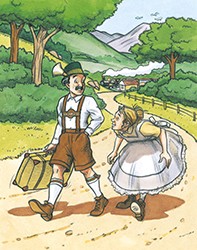Innocence revisited – 30
This month, Dr Robyn Pogmore shares a tale of two chance encounters.
‘Ah, look at all the lonely people…’ Eleanor Rigby, The Beatles, 1966
I spent my married life in Germany, trying to behave like a devoted wife and loving mother. Never a day passed when there did not happen something that perplexed and confounded me. One day my husband, who worked as a GP, came home agog with excitement. He rushed through the house to the telephone, pausing only to tell me that he had met someone who had met Albert Einstein. He called one of his good friends, and there ensued a long conversation about the matter in the local dialect. Then he spent the evening with his beer and a large book called Great men of all ages (or something like that) that lived with the Bible and The complete works of Goethe somewhere on the top shelf. I never got around to looking at them.
My husband was a very cerebral man and his friends were even worse. Many of them had dallied for years in Catholic seminaries. For light conversation they discussed Nietsche and Schopenhauer; when holiday time came they would go on a pilgrimage. Their passions and enthusiasms were often beyond my understanding, and I was quite out of touch with their culture. But then, in those days my life was very much centred around dirty nappies, runny noses and banana in the carpet. And I was Protestant anyway, and Australian, which was somehow worse. So I admit that I was a little scornful of all the fuss over someone who had met someone. Furthermore, I could remember a song called ‘I’ve danced with a man, who’s danced with a girl, who’s danced with the Prince of Wales’.
As an Australian doctor in a foreign country I was not considered much use to anybody, but I had to do some token work in my husband’s practice because I needed to be on the books for taxation purposes. So I would go out to take patients’ blood sugar or blood pressure measurements, or remind them about things, or return things that had been left in the surgery waiting room. And so it came to pass that one day I was instructed to take a certificate to a certain woman to be signed. She could not come into the practice because she was crippled, my husband said, and she was the someone who had met Einstein.
I called around the next day. She was an ancient woman, huddled in one corner of a very cold and smelly room. Even in the poor light I could see the most extreme scoliosis – her body was quite bent around on itself. She signed my certificate happily and then settled down to tell me about her meeting with Einstein. It seems to me that it must have been the one big event in her life – after being run over by a bullock wagon as a child.
The bullock wagon accident had left her with a limp and horrendous deformity, and she was unable to marry or have children or to perform heavy work in the field or stables. So, she found a job as a scullery maid in an isolated hotel in the mountains where conventions were held. One day, when the hotel was short of staff, she was sent down to the train station to meet an important visitor. It was Mr Einstein.
He was very polite to her, she said, very courteous. He would not hear of her carrying his suitcase for him, and he made conversation during the walk back to the hotel.
The old woman looked very happy as she told me her story. I feel that Einstein had changed her life, somehow, in that short, or long, walk. I imagine the two of them, the young mathematician and the crippled servant girl, walking along leafy lanes and scenic Alpine paths. Think of it – a young German man with every reason to be proud, who took pity on the deformed young peasant woman whose duty it was to carry his suitcase. I love to think of that story, so I guess he has had a subtle influence on my life too.
The woman is dead now, of course. Her last years were spent in wretched poverty, loneliness and pain. She had outlived her contemporaries and produced no children, so she would have had a pauper’s funeral with no-one to mourn for her except the local Franciscan monks who considered it their duty to pray for those who had no-one else to pray for them. Yet she had experienced something very special, and she had held it proudly for the rest of her life.
She had met the great Einstein! MT

